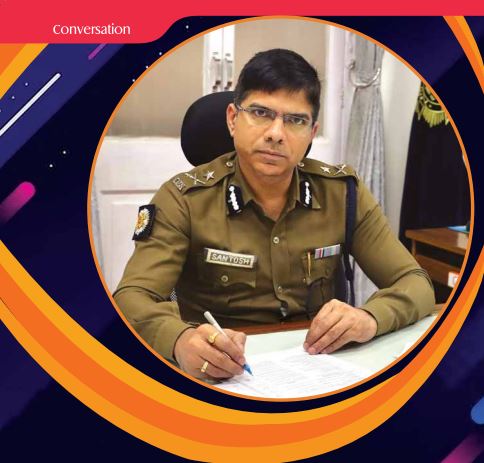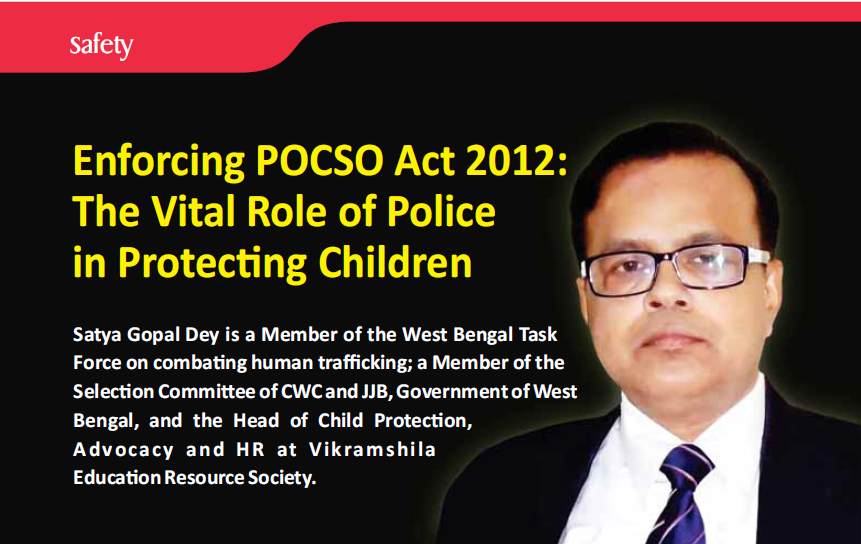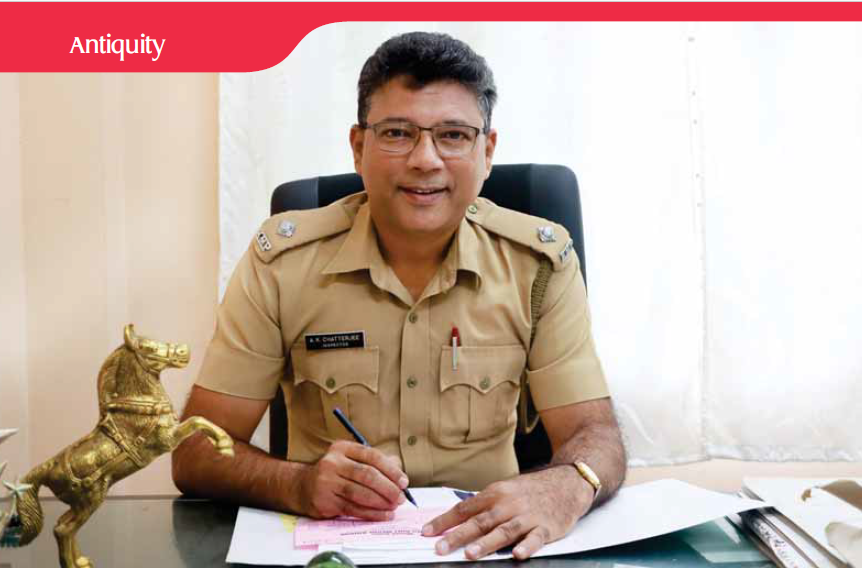In a candid discussion with Team PROTECTOR, Shri Santosh Pandey, a highly decorated IPS officer from the 2006 batch, currently serving as the Additional Commissioner of Police in the Kolkata Police, talked about his experiences in the police force.
Excerpts from the conversation ……..
Joining the Civil
Services – A Game Changer
I hail from Bihar, where aspiring to join the Civil Services is a common dream, and civil servants are deeply respected. Pursuing a career in the Indian Civil Services was a dream since childhood, and I dedicated myself to achieving it. It was not easy. I prioritised academic excellence from a young age and maintained a methodical approach throughout. Despite having other options, I was focused on maintaining a high standard of performance. Even now, as a senior police officer in Kolkata Police, I continuously try to excel in my role and improvise myself in key areas, where I feel I must improve and upgrade. The journey of preparing for the country’s most prestigious examination transformed me into a true professional.
Preparing for the Toughest Test
Theoretically, I covered every item mentioned in the syllabus, benefiting from a comprehensive academic approach. The entrance examination itself is rigorous and thorough. I have observed many young students enrolling in various coaching institutes to gather study materials, which can be helpful. However, I believe in customising preparation methods. The internet, serving as an open encyclopedia of data and information, can greatly benefit any civil service aspirant. The key remains consistent for everyone: covering all subjects, understanding them in an organised manner, and grooming oneself. We did not overly stress about the different stages of the examination. Many students succumb to extreme pressure of performing at the highest level. While some of my peers have not succeeded in entering the civil services, it is important to remember that it is not the end of the world. Give your best effort and accept whatever outcomes it brings to your career.
Defining ‘Duty’ in Uniform
As I returned from the Hyderabad Police Academy and later from my time in Barrackpore, my focus has been on various assignments. I still vividly remember the days when I had the responsibility, and independent charge, of Binpur. Subsequently, I gained valuable experiences in Howrah and other districts. What does it mean to be the first responder? This question has taught me many life lessons, which I often share with the new officers joining the force. It is important to make it clear that the police are not an external entity; rather, society is reflected in the police services. I still recall the days after Cyclone Amphan when we were at the forefront of rescuing the victims. It was definitely challenging, but that is what ‘duty’ is all about. In Howrah, there was an incident that led to a road blockade by the local citizens. I made it a priority to sit and talk with them patiently and perseveringly. Ultimately, it proved to be fruitful, and the road blockade was quickly removed. I have often observed that the ‘humanity’ aspect of the police forces does contribute to the trust-building process.
Policing in the Urban Context
In my nearly two decades of service in uniform, I have been fortunate to work in both urban and rural areas. It is important to note that direct comparisons between them are unfair due to differing socio-economic structures. Additionally, rural India is rapidly evolving, evident from the emergence of Tier 1 and Tier 2 cities. However, urban policing presents its unique set of challenges and solutions. Take Kolkata, for instance—a historic city with a high population density and one of the largest metro areas. Preparedness in the Kolkata Police Force is consistently high, given the city’s status as the State capital, which places it under national and international scrutiny. Coercive force is seldom necessary; instead, senior officers prioritise tact and communication. Even in challenging circumstances, the focus remains on fostering smooth communication and reaching amicable solutions for the city’s benefit.
Technology plays a pivotal role, with extensive use of CCTV cameras for preventing crimes like theft and robbery, as well as for managing road traffic. The continuous collection and analysis of digital evidence, along with digital monitoring, have been immensely beneficial. Additionally, social media has emerged as a powerful tool for gathering constant feedback, thereby enhancing policing efforts.
Deploying Police Personnel Rationally
The deployment of police personnel is a critical decision for any police department, especially from a South Asian perspective. In India, police personnel serve as social enablers, utilising resources to maintain law and order effectively. A robust police force is all about having the perfect balance. The role of the reserve police force cannot be ignored either. In Kolkata Police, deployment is carried out with scientifically and logically. It is undeniable that day-to-day planning involves meticulous coordination at every level, from bureaucrats and ministries to police stations and special branches. This continuous effort, executed 365 days a year, deserves much applause.
Make no mistake, it is never about static planning but dynamic planning that keeps the Kolkata Police Force ever ready. Special occasions like the Durga Puja celebration and other events necessitate heavy deployment. Institutional memory serves as a crucial template in this regard. Over the past decade, Kolkata Police has placed significant emphasis on community development programmes.
The humane face of the Kolkata Police has yielded substantial dividends in the broader context. During the COVID-19 pandemic, the Kolkata Police Force received widespread acclaim for its wholehearted approach in reaching out to everyone. Undoubtedly, this entire endeavour demands a paradigm shift in policing which the Kolkata Police Department has adopted to seamlessly.
Resource deployment for the Kolkata Traffic Police differs significantly from other departments. Currently, the Kolkata Traffic Police is majorly reliant on real-time manpower. While we leverage modern technologies to alleviate traffic congestion and prevent fatal accidents, monitoring and prosecution remain key priorities. While technology plays a crucial role, the importance of manpower cannot be overstated. The role of Kolkata Traffic Police personnel in addressing issues on the spot remains significant. To ensure efficient deployment, we regularly analyse Traffic Survey Sampling data. This enables us to make rational decisions without any wastage.
Policing – The Road Ahead
Policing is evolving alongside society, and this can be observed all over the world. The Kolkata Police has adopted liberal and dynamic approaches, contributing to Kolkata being recognised as the safest city in the country, a recognition that carries significant responsibility for the Kolkata Police.
In the post-COVID era, it is evident that cybercrime has largely replaced traditional criminal activities. The positive aspect is that most forms of cybercrime can be prevented. However, this requires widespread social awareness and digital literacy. In this regards, the Kolkata Police is leading various online and offline initiatives to increase awareness about digital literacy and best practices.
Overall, the Kolkata Police has been highly successful in using technology to make people more vigilant against preventable cybercrime. We are hopeful that in the future, Kolkata Police’s approach to cyber policing will become a benchmark for the entire country.






